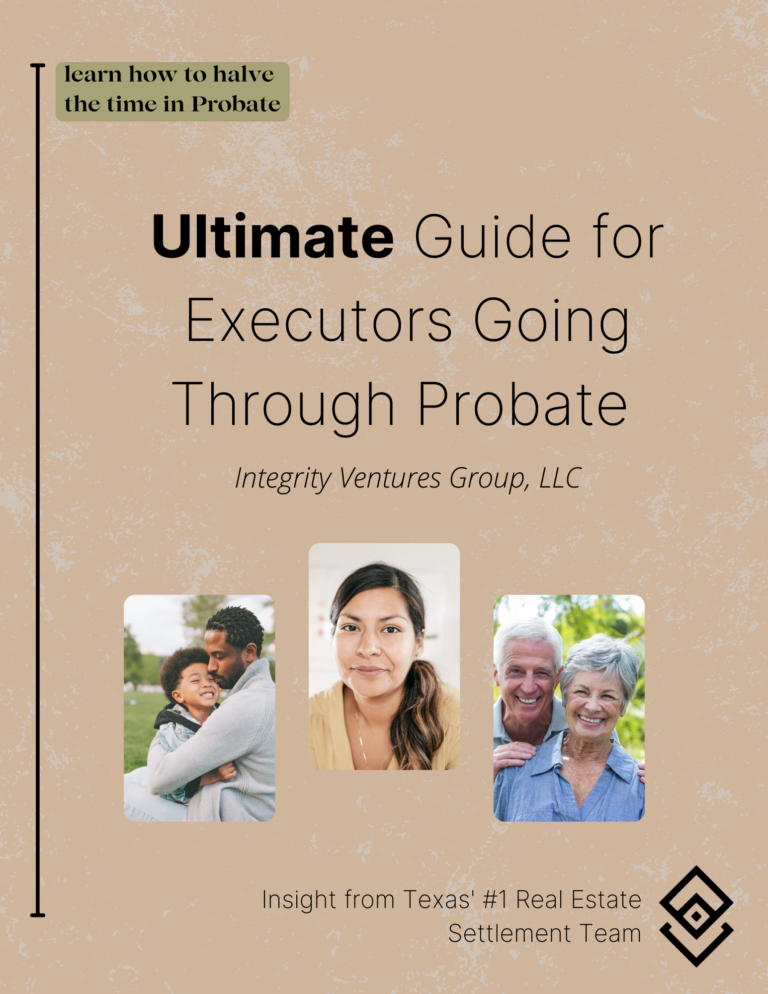do you want to cut your probate Process time in half?
Do I Pay Capital Gains on Inherited Property in Texas?
disclaimer
Integrity Ventures Group asserts that it is not a licensed lawyer, and this article is intended solely for providing general guidance and information, and should not be considered as legal advice or a substitute for consulting with a qualified attorney. For any specific legal grievances related to personal probate cases, we strongly advise individuals to seek professional legal counsel and engage the services of a licensed attorney.
At Integrity Ventures Group, we pride ourselves on being the premier estate settlement firm in Texas. Our expertise lies in assisting families daily, helping them unravel the complexities of their probate proceedings alongside their attorneys. We would be honored to extend our knowledge to help guide you through your unique journey as well. Let’s Dive into: Do I Pay Capital Gains on Inherited Property in Texas?
Introduction:
Inheriting a property can be both a blessing and a complex legal maze to navigate, especially when it comes to understanding the tax implications. This subject becomes even more intricate when it intertwines with Texas probate laws and CPA (Certified Public Accountant) regulations. One key question that many people have is: Do I pay capital gains tax on inherited property after selling it? This article delves into the intricacies of gross and net capital gains after paying off debts tied to the estate, Texas probate laws, and CPA guidelines.
Understanding Capital Gains Tax and Inherited Property
When you sell a property that you’ve inherited, the IRS considers the profits you make as capital gains. However, the basis for the property—the value from which the gain is calculated—is not what the deceased person originally paid for it. Instead, it’s its fair market value at the time of their death (or six months after, depending on the estate’s choice). This “step-up in basis” can significantly reduce your capital gains tax.
Gross vs. Net Capital Gains
Gross Capital Gains: This is the full amount of profit made from selling the inherited property.
Net Capital Gains: This is what remains after you subtract the cost of selling (commissions, closing costs, etc.) and any debts associated with the property that you had to pay off.
Texas Probate Laws and Estate Debts
Before diving into the tax intricacies, it’s essential to understand the Texas probate laws that govern how an estate is settled.
Dependent vs. Independent Administration: Whether the administration is dependent or independent has an impact on how quickly assets can be distributed and debts paid off.
Inventory and Appraisal: Within 90 days of being appointed, the executor/administrator must submit an inventory, appraisement, and list of claims that estate holds.
Debt Payment: Before any distribution to heirs, the estate’s debts must be paid off, which can include mortgages or liens against the property.
If the estate has more debts than assets, the inherited property may need to be sold to satisfy creditors, irrespective of capital gains considerations.

How CPAs Come Into Play
A Certified Public Accountant (CPA) specialized in estate planning and tax can offer indispensable advice. They can help:
Evaluate the fair market value of the inherited property.
Calculate gross and net capital gains.
Help you understand what deductions can be made, such as the cost of home improvements or selling costs.
Provide tax planning strategies to minimize capital gains tax.
CPAs are regulated by the Texas State Board of Public Accountancy and are subject to various laws and regulations that ensure they provide accurate and ethical advice.
Calculating Capital Gains Tax After Paying Off Debts
Here’s a simplified example:
Fair Market Value at Time of Death: $300,000
Debts Owed (e.g., Mortgage, Liens): $50,000
Selling Price: $320,000
Selling Costs (e.g., realtor fees, closing costs): $20,000
Steps:
Pay off Debts: $300,000 (Fair Market Value) – $50,000 (Debts) = $250,000
Calculate Gross Capital Gains: $320,000 (Selling Price) – $300,000 (Fair Market Value) = $20,000
Calculate Net Capital Gains: $20,000 (Gross Capital Gains) – $20,000 (Selling Costs) = $0
In this example, you would not owe any capital gains tax as your net capital gain is zero.
Exceptions and Exclusions
Inherited Property as Primary Residence: If you use the inherited property as your primary residence for at least two years before selling, you may exclude up to $250,000 ($500,000 for married couples filing jointly) from capital gains.
Capital Losses: If you sell the property at a loss, these losses could offset other capital gains in the same year.
Gift and Estate Tax Exclusion: For 2021, the federal gift and estate tax exclusion is $11.7 million, meaning estates below this value are not subject to federal estate taxes, although capital gains are a separate consideration.
Conclusion
Settling an estate and dealing with inherited property can be a complex process governed by both Texas probate laws and federal tax guidelines. A CPA specialized in these matters can be an invaluable resource. Understanding the nuances of gross vs. net capital gains, especially after debts tied to the estate are paid off, can make a significant difference in your financial liability.
Remember, while inheriting property is often seen as a windfall, it comes with its share of responsibilities and complexities. Always consult with professionals to navigate the legal and financial intricacies effectively.
Disclaimer: This article is meant for informational purposes only and should not be taken as legal or financial advice. For personalized recommendations, consult a qualified attorney or CPA.
Sources:
- IRS Publication 523
- Texas Estates Code
- Texas State Board of Public Accountancy Rules
- IRS Publication 551
Note: Laws and regulations can change, and each individual’s situation can vary. Therefore, for the most current and personalized advice, consult qualified professionals.
FIND MORE HELPFUL ARTICLES LIKE THIS ONE
DOWNLOAD YOUR PROBATE CHECKLIST TODAY.
Become a part of the numerous executors who have already benefited from our free guide. Elevate your probate process with our complimentary probate checklist, designed to guide you step by step through the process of selling your real estate property today. Download it now and streamline your journey through probate.






